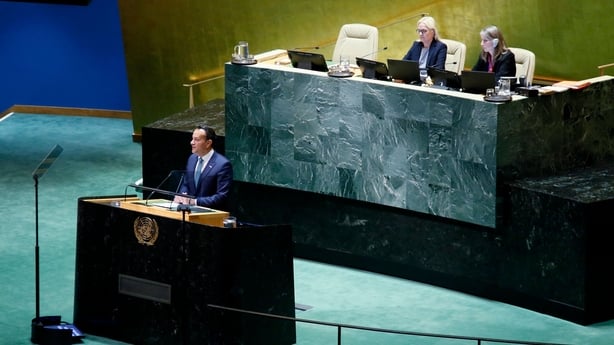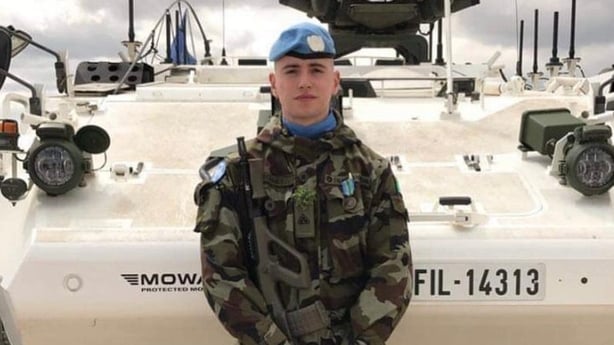The Taoiseach has told the UN General Assembly that Ukraine deserves the unqualified support of every member state in the United Nations and that Russia and its leaders deserve utter condemnation.
Leo Varadkar also said it is beyond time for the countries of the world to show that the Sustainable Development Goals (SDG) are more than a set of aspirations.
Delivering the national statement to the UN General Assembly, the Taoiseach said climate change and its effect on the world's food supply was undeniable and required countries to implement the Sustainable Development Goals.
"The devastating effect of climate change is contributing to increasing numbers of humanitarian crises, with record numbers of people in need of humanitarian assistance," he said.
"We have seen the stalling - and, in some cases, the reversal - of progress towards the 17 Sustainable Development Goals we collectively agreed to implement," he added.
Mr Varadkar said Ireland had implemented 80% of its national SDG programme. The global average is just 15%.
He said Ireland is pledged to spend €225m a year on climate finance for developing countries from 2025 onwards, compared to €149m this year.
Ireland's own Famine experience led the country to have a particular focus on food, agriculture and nutrition, and this year it will spend around €300m for programmes in these areas, he said.
"We allocate over 90% of our country-specific humanitarian expenditure to the most severe crises," Mr Varadkar said.
"We have increased our expenditure on global health by over 15% in the last three years.
"And we are consistently amongst the top three donors in the proportion of our official development assistance allocated to promoting gender equality."

On Ukraine, Mr Varadkar said Russia had engaged in an imperialist and brutal invasion of its smaller weaker neighbour, warning other states that "when one aggressor prevails, its peers elsewhere take note and become emboldened, threatening all".
He said Russia was an" expansionist, revanchist power" and had launched an unprovoked and unjustified aggression against Ukraine.
"The brutality of Russia's actions in Ukraine has caused unfathomable suffering for the people of that country," Mr Varadkar told the General Assembly.
"And, as I stand on this most global of stages, I am deeply conscious of the wider suffering it has caused, increasing global food, energy and economic insecurity," he said.
"Russia's inexplicable decision last month to collapse the Black Sea Grain Initiative has only made this bad situation worse," he added.
Appealing to countries in other continents, Mr Varadkar said the Ukraine war should concern them all as it violated the basic principles of the UN charter.
Mr Varadkar said: "When Europeans draw attention to the profound injustice of what is happening in Ukraine, there can be criticism, some of it justified, of the developed world’s failure to respond with the same intensity of feeling and action to conflict and suffering elsewhere.
"But, while we can acknowledge that we have fallen short, the people of Ukraine should not be the ones asked to pay the price. They have done nothing to bring down this war on their heads.
"They deserve the right we all claim - to determine their own future, in peace and security.
"They deserve the unqualified support - and the action to back it up - of every single member state of these United Nations.
"Equally, the Russian Federation and its leaders deserve our utter condemnation for what they have done and are continuing to do. They must be held accountable," he said.
Mr Varadkar described Russia's threats to use nuclear weapons in the Ukraine war as "outrageous".
He said Ireland has long worked for a world free of nuclear weapons, but today sees a world "in which their place in security doctrines is growing, rather than diminishing," adding that this must be reversed, as the stark alternative is a new nuclear arms race.
The Taoiseach also spoke of his concern at the ongoing threats to UN peacekeeping operations.
"We see with even national authorities seeking the withdrawal of UN peacekeepers, compromising the security of their own people and creating further conflict," he said.
He recalled for the General Assembly the killing of Private Seán Rooney in Lebanon last December while serving with the UN Interim Force in Lebanon (UNIFIL).

"We think too of his family and his comrades, and of all the women and men who have lost their lives in the pursuit of peace," he said.
Mr Varadkar also addressed the Israeli-Palestinian conflict, where he said the international community had failed for a hundred years in efforts to bring peace.
"We have known for decades the parameters of the only just solution: a two-state solution, with a viable Palestinian state based on the 1967 borders, living in peace and security alongside the state of Israel, who's right to exist should be accepted and respected by all its neighbours," Mr Varadkar said.
"We have affirmed and reaffirmed this many times. Yet, day after day, developments take us further from this vision and make a two-state solution harder to handle," he said.
Mr Varadkar said that "we see acts of terrorism perpetrated against Israeli and Palestinian civilians; increasingly dangerous and provocative rhetoric; and clear violations of international law".
He said: "The political and civic space for those who seek to promote peace and reconciliation is diminishing. And the consequences are stark.
"My country, along with many others, wholeheartedly agreed with the resolution passed by this Assembly, seeking an advisory opinion from the International Court of Justice on the legal consequences arising from Israel's prolonged occupation. Alongside many here today, we have submitted a statement to the court.
"To those who argue that having recourse to the court undermines the search for a political solution, I can only ask how the clarification of international law can do anything other than strengthen international peace and security.
"A just and sustainable peace can only be based on international law, on accountability, human rights, on the principles and purposes of the UN Charter," he said.
The Taoiseach said Ireland supports reform of the UN Security Council by scrapping the veto power of the permanent five members and expanding membership to better reflect the demography and politics of today.





